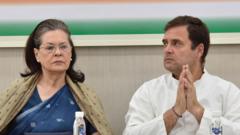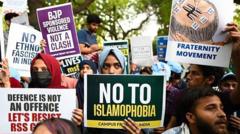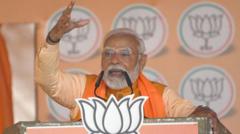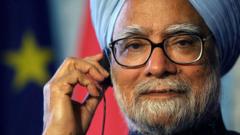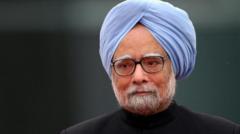The recent death of a 10-year-old rape survivor in Bihar has ignited widespread anger across India, as allegations emerge regarding medical negligence. The girl passed away on Sunday at the Patna Medical College and Hospital (PMCH) following an incident where her uncle claims she was left unattended in an ambulance for upwards of four hours before receiving admission.
Outrage in India after 10-year-old Rape Victim Dies Following Alleged Medical Negligence

Outrage in India after 10-year-old Rape Victim Dies Following Alleged Medical Negligence
The tragic death of a young rape victim in Bihar raises serious concerns over healthcare and social justice.
As details unfold, PMCH officials have refuted claims of any delay, labeling them as unfounded. However, the public outcry over her death reflects a broader issue surrounding the treatment of Dalits—those at the bottom of the Hindu caste hierarchy—who frequently endure systemic discrimination despite laws that should safeguard their rights.
The tragic incident followed the girl’s brutal assault on May 26, allegedly perpetrated by a local man from her neighborhood in Muzaffarpur. After being found injured, she was initially taken to a nearby hospital and subsequently transferred to Sri Krishna Medical College and Hospital (SKMCH), where it was reported she suffered multiple knife wounds. Kumari Vibha, the superintendent at SKMCH, disclosed that although she stabilized, the girl required surgical reconstruction of her windpipe, leading to her referral to PMCH.
The circumstances surrounding her admission have sparked intense debate. Her uncle contended that they were subjected to unnecessary delays while navigating the hospital bureaucracy, waiting in an ambulance before being moved across various departments. The hospital’s IS Thakur claimed the child was initially seen in pediatrics and shifted to the Ear, Nose, and Throat (ENT) department before being transferred to a gynecology ICU due to the lack of resources.
The story intensified when a video surfaced showing opposition Congress party members clashing with hospital officials over the girl's treatment, stirring protests among opposition parties throughout Bihar. Rahul Gandhi, one of the Congress leaders, condemned the incident as deeply embarrassing, urging stringent accountability for hospital negligence.
Voices from within the ruling BJP and their coalition partner JD(U) steered clear of amending facts. BJP spokesperson Anamika Singh Patel expressed sorrow over the girl's demise but reiterated that hospital procedures can often be prolonged.
This incident has intensified scrutiny of Bihar’s healthcare system ahead of upcoming state assembly elections, illustrating ongoing challenges within medical infrastructure. Reports indicate that only 50% of ventilators in government hospitals are operational, with alarming doctor-to-patient ratios, and deeply unsatisfactory medical conditions often described by patients.
As India grapples with the implications of this tragedy, it echoes a familiar call for justice and systemic reform in dealing with the sensitive issues of sexual violence and healthcare access for vulnerable populations.
The tragic incident followed the girl’s brutal assault on May 26, allegedly perpetrated by a local man from her neighborhood in Muzaffarpur. After being found injured, she was initially taken to a nearby hospital and subsequently transferred to Sri Krishna Medical College and Hospital (SKMCH), where it was reported she suffered multiple knife wounds. Kumari Vibha, the superintendent at SKMCH, disclosed that although she stabilized, the girl required surgical reconstruction of her windpipe, leading to her referral to PMCH.
The circumstances surrounding her admission have sparked intense debate. Her uncle contended that they were subjected to unnecessary delays while navigating the hospital bureaucracy, waiting in an ambulance before being moved across various departments. The hospital’s IS Thakur claimed the child was initially seen in pediatrics and shifted to the Ear, Nose, and Throat (ENT) department before being transferred to a gynecology ICU due to the lack of resources.
The story intensified when a video surfaced showing opposition Congress party members clashing with hospital officials over the girl's treatment, stirring protests among opposition parties throughout Bihar. Rahul Gandhi, one of the Congress leaders, condemned the incident as deeply embarrassing, urging stringent accountability for hospital negligence.
Voices from within the ruling BJP and their coalition partner JD(U) steered clear of amending facts. BJP spokesperson Anamika Singh Patel expressed sorrow over the girl's demise but reiterated that hospital procedures can often be prolonged.
This incident has intensified scrutiny of Bihar’s healthcare system ahead of upcoming state assembly elections, illustrating ongoing challenges within medical infrastructure. Reports indicate that only 50% of ventilators in government hospitals are operational, with alarming doctor-to-patient ratios, and deeply unsatisfactory medical conditions often described by patients.
As India grapples with the implications of this tragedy, it echoes a familiar call for justice and systemic reform in dealing with the sensitive issues of sexual violence and healthcare access for vulnerable populations.







